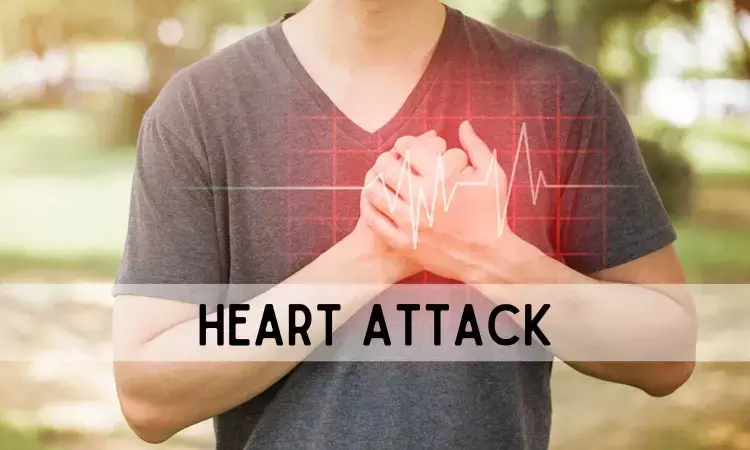- Home
- Medical news & Guidelines
- Anesthesiology
- Cardiology and CTVS
- Critical Care
- Dentistry
- Dermatology
- Diabetes and Endocrinology
- ENT
- Gastroenterology
- Medicine
- Nephrology
- Neurology
- Obstretics-Gynaecology
- Oncology
- Ophthalmology
- Orthopaedics
- Pediatrics-Neonatology
- Psychiatry
- Pulmonology
- Radiology
- Surgery
- Urology
- Laboratory Medicine
- Diet
- Nursing
- Paramedical
- Physiotherapy
- Health news
- Fact Check
- Bone Health Fact Check
- Brain Health Fact Check
- Cancer Related Fact Check
- Child Care Fact Check
- Dental and oral health fact check
- Diabetes and metabolic health fact check
- Diet and Nutrition Fact Check
- Eye and ENT Care Fact Check
- Fitness fact check
- Gut health fact check
- Heart health fact check
- Kidney health fact check
- Medical education fact check
- Men's health fact check
- Respiratory fact check
- Skin and hair care fact check
- Vaccine and Immunization fact check
- Women's health fact check
- AYUSH
- State News
- Andaman and Nicobar Islands
- Andhra Pradesh
- Arunachal Pradesh
- Assam
- Bihar
- Chandigarh
- Chattisgarh
- Dadra and Nagar Haveli
- Daman and Diu
- Delhi
- Goa
- Gujarat
- Haryana
- Himachal Pradesh
- Jammu & Kashmir
- Jharkhand
- Karnataka
- Kerala
- Ladakh
- Lakshadweep
- Madhya Pradesh
- Maharashtra
- Manipur
- Meghalaya
- Mizoram
- Nagaland
- Odisha
- Puducherry
- Punjab
- Rajasthan
- Sikkim
- Tamil Nadu
- Telangana
- Tripura
- Uttar Pradesh
- Uttrakhand
- West Bengal
- Medical Education
- Industry
Myocardial infarction tied to faster cognitive decline over time: JAMA

USA: A recent study published in JAMA Neurology has stressed the importance of myocardial infarction (MI) for long-term brain health.
The study by a Johns Hopkins Medicine researcher and collaborators showed that having a heart attack, among those who had never had one before, was not associated with a sudden decline in cognition. But, for those who had a heart attack versus those who did not, there was a significantly faster decline in cognition over the years following the heart attack. The decline in global cognition after a heart attack was equivalent to six to 13 years of cognitive ageing.
A heart attack, or myocardial infarction, is a medical emergency in which the blood supply to the heart is suddenly and severely reduced or cut off, causing the muscle to die from a lack of oxygen. According to the Centers for Disease Control and Prevention, every year about 805,000 people in the United States have a heart attack. Of these, 605,000 are a first heart attack, and 200,000 happen to people who have already had a heart attack.
“Due to the fact that many people are at risk for having a heart attack, we hope that the results of our study will serve as a wake-up call for people to control vascular risk factors like high blood pressure and elevated cholesterol as soon as they can since we have shown that having a heart attack increases your risk of decreased cognition and memory later on in life,” says Michelle Johansen, M.D., Ph.D., an associate professor of neurology at the Johns Hopkins University School of Medicine.
The researchers analyzed data on adults to determine if there is a link between having a heart attack and cognitive decline. In a pooled analysis of six different large studies of adults between 1971 and 2019, researchers determined whether people who have had heart attacks showed changes in cognition compared with people similar to them in all respects except they had not had a heart attack. The researchers used a point system to measure participants’ global or overall cognition over time, memory, and executive functioning — or how well people make complex cognitive decisions.
For those who suffered a heart attack, while the researchers did not find significant cognitive decline immediately after their first heart attack, the participants’ cognitive tests showed a decline over the years following the event. The scores on several different cognitive tests were combined to represent one cognitive domain. A decrease in points indicated a decline in that cognitive domain.
The study sample comprised 30,465 people who had not experienced a heart attack or stroke and did not have dementia at the time of the first cognitive assessment; 29% of the individuals were Black, 8% were Hispanic and 56% were women. Of the overall sample, 1,033 individuals went on to have at least one heart attack, and out of that, 137 had two heart attacks. Individuals who experienced heart attacks were more likely to be older and male.
Johansen says the next steps are to look at other aspects of heart health and how they may affect brain health.
“We have shown that preventing heart attacks may be one strategy to preserve brain health in older adults,” Johansen says. “Now we need to determine what specifically is causing the cognitive decline over time.”
References:- The Johns Hopkins University School of Medicine, Baltimore, Maryland, University of Michigan Medical School, Ann Arbor, National Institute of Neurological Disorders and Stroke, Bethesda, Maryland, Columbia University, New York, New York, University of Miami, Miami, Florida, University of Washington, Seattle, Division of Research, Kaiser Permanente Northern California, Oakland, California, University of California, San Francisco, Wake Forest University School of Medicine, Winston-Salem, North Carolina, JAMA Neurol. Published online May 30, 2023. doi:10.1001/jamaneurol.2023.1331
Dr Kamal Kant Kohli-MBBS, DTCD- a chest specialist with more than 30 years of practice and a flair for writing clinical articles, Dr Kamal Kant Kohli joined Medical Dialogues as a Chief Editor of Medical News. Besides writing articles, as an editor, he proofreads and verifies all the medical content published on Medical Dialogues including those coming from journals, studies,medical conferences,guidelines etc. Email: drkohli@medicaldialogues.in. Contact no. 011-43720751


